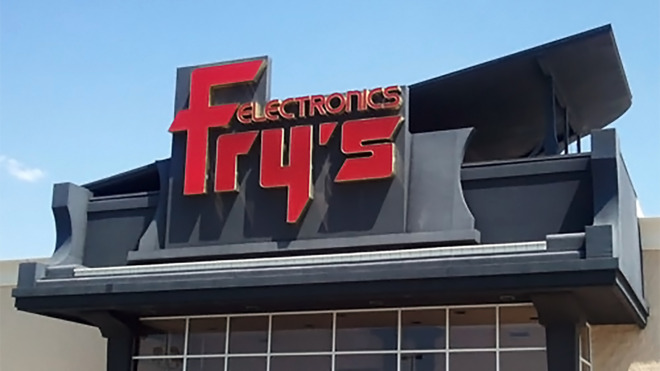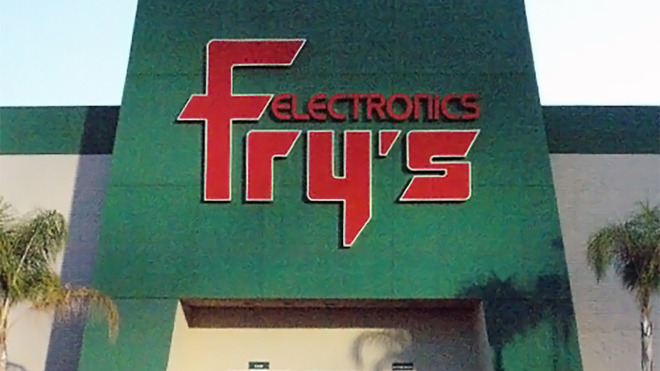Long-time Apple retailer Fry's Electronics suddenly shuts down
After 36 years in business, Fry's Electronics, a big-box electronics store founded during the early days of Apple, announced that it is shutting down effective immediately.

A live-music-themed Fry's location in Austin, TX
In a letter posted on the company website, the retailer attributed the closure to changes in the retail industry and challenges posed by the COVID-19 pandemic. Fry's said it would implement the shut down "through an orderly wind-down process that it believes will be in the best interests of the Company, its creditors, and other stakeholders."
Fry's had been a long-time Apple Authorized Reseller, selling Macs and eventually iPhones, iPads, and other products as Apple evolved from an innovative 1980s computer company to the $2.3 trillion consumer-technology behemoth we know today.
The first Fry's Electronics opened its doors in 1985. Three brothers, all heirs to the Fry's Supermarkets chain, joined with a fourth partner to shun the grocery industry and instead open the initial location in Northern California. Fry's physical "superstores" were enormous. The first location in Sunnyvale, California, was 20,000 sq ft, and each of the 34 stores it had at its peak reflected that sprawling blueprint.
Stores would implement themes, including an Ancient Rome-themed location in Fountain Valley, California, and an ode to Live Music in Austin, Texas.
Many big-box retailers have struggled to keep up, as Amazon and other online retailers have shifted how consumers buy electronics. Those massive storeroom floors made more sense in the days of bulky computers and TV sets, and fewer Internet-ordering options. Filling and justifying that space in the age of smartphones and flat-screens -- while competing with an online behemoth of Amazon's stature - proved an uphill battle.
In the age of Amazon, fellow electronics-retail pioneer Circuit City closed its doors in 2009, RadioShack filed for bankruptcy in 2015, and Best Buy has struggled to adapt and keep afloat.

Fry's is ceasing operations immediately, closing physical stores and its online presence
In a 2019 blog post, former Apple executive Jean-Louis Gassee described Fry's stores as "sad, pale shadows of their glorious past." Gassee, who had worked as a Fry's cashier briefly after getting fired from Apple, lamented the Palo Alto Fry's state when he visited. He saw an empty parking lot, bare and half-empty shelves, and an overall image of "sad poverty."
Fry's Electronics says it is in the process of reaching out to customers with repairs and consignment vendors to help them understand what the closure will mean for them. The company urges customers with active repairs to reach out and know it may be slow responding.

A live-music-themed Fry's location in Austin, TX
In a letter posted on the company website, the retailer attributed the closure to changes in the retail industry and challenges posed by the COVID-19 pandemic. Fry's said it would implement the shut down "through an orderly wind-down process that it believes will be in the best interests of the Company, its creditors, and other stakeholders."
Fry's had been a long-time Apple Authorized Reseller, selling Macs and eventually iPhones, iPads, and other products as Apple evolved from an innovative 1980s computer company to the $2.3 trillion consumer-technology behemoth we know today.
The first Fry's Electronics opened its doors in 1985. Three brothers, all heirs to the Fry's Supermarkets chain, joined with a fourth partner to shun the grocery industry and instead open the initial location in Northern California. Fry's physical "superstores" were enormous. The first location in Sunnyvale, California, was 20,000 sq ft, and each of the 34 stores it had at its peak reflected that sprawling blueprint.
Stores would implement themes, including an Ancient Rome-themed location in Fountain Valley, California, and an ode to Live Music in Austin, Texas.
Many big-box retailers have struggled to keep up, as Amazon and other online retailers have shifted how consumers buy electronics. Those massive storeroom floors made more sense in the days of bulky computers and TV sets, and fewer Internet-ordering options. Filling and justifying that space in the age of smartphones and flat-screens -- while competing with an online behemoth of Amazon's stature - proved an uphill battle.
In the age of Amazon, fellow electronics-retail pioneer Circuit City closed its doors in 2009, RadioShack filed for bankruptcy in 2015, and Best Buy has struggled to adapt and keep afloat.

Fry's is ceasing operations immediately, closing physical stores and its online presence
In a 2019 blog post, former Apple executive Jean-Louis Gassee described Fry's stores as "sad, pale shadows of their glorious past." Gassee, who had worked as a Fry's cashier briefly after getting fired from Apple, lamented the Palo Alto Fry's state when he visited. He saw an empty parking lot, bare and half-empty shelves, and an overall image of "sad poverty."
Fry's Electronics says it is in the process of reaching out to customers with repairs and consignment vendors to help them understand what the closure will mean for them. The company urges customers with active repairs to reach out and know it may be slow responding.

Comments
I like Amazon and all, I've had a Prime membership for many years, but F them for causing all this. As great as it is to be able to order anything online and have it delivered right to your door the next day, I still enjoy walking into a physical store and getting to touch, hold and play with all the latest tech gadgets. There's just nothing like it. Amazon could have 1 hour or less delivery, thats still no substitution.
Yeah, traffic jams, red lights, stopping to get gasoline, finding a parking space, and waiting in line to checkout are the best parts of my day! All the fun you miss by click-click-buy and having it delivered to your door in a day (or same day w/Amazon) is just a real bummer. /s
Now I use amazon to find the item(s) that I need and find out who makes or sells it and buy it there. I’ll pay 2-3 times the price on amazon but I feel much better having a local vender get my money and hopefully stay in business than giving bezos a penny.
I did like my nearby Tiki themed one. (Heck, I think it had a tube tester in the corner of the electronic parts section)
This is where I learned Sony was a master at knowing the features people really wanted and pay for it. Sony would have 10 models priced from $300 to $1200. As you would go from one model to the next you would finds that next model up did not have one or two of the feature the previous model had but have two or three new features. If you wanted the feature you saw in 3 other models you would have to go up 2 or 3 models in the line to find them all in the same model. I came in wanting to spend under $500 and ended up spending close to $800 to get the 3 features I really wanted. Other store would carry the low end mid tier and high end, if you did not know that Sony had other models you could end up buying the high end model just to get the feature you wanted which could have cost you less.
If you want more of the real hobbyist/maker stuff you'll have to go with places like Jameco, Mouser, or Digi-Key. My crude litmus test is to search for "Fluke" on their web site. If they actually sell Fluke brand products, that's a good sign. If the search returns a $22.00 "kinda sorta looks like a Fluke" product (cough cough ... Harbor Freight), try not to run into any of the shipping containers parked behind the store.
I agree with Mike that MicroCenter is still very decent, with a mini Apple Store and separate sections for makers/hobbyists and system builders with all kinds of cool toys and components galore. Any place where you can buy motherboards, bare chassis, power supplies, CPUs, memory boards, I/O cards, several dozens of choices for different peripherals, etc., is my kind of place and MicroCenter delivers in spades. Yeah, they are a bit nosy in their quest to get you on their mailing list, and some of their sales people seem to be stalkers-in-training to get their sales sticker on whatever you buy, but their awesome variety, selection choices, and low prices will keep you coming back for more.
Amazon is okay too, if you know what you're looking for, brand wise, and don't mind digging around a bit to get the right price.
Late last month I drove down there for the first time in about ten years because I wanted to try out red, brown, and blue cherry keyboards. The shelves were bare, and what products they did have on the shelves were all no-name crap. The huge section of furniture had nothing but a couple of random boxes in it. The audio demo rooms were empty and only had random wires sticking out of the walls. The appliance and car audio sections were roped off. The hardware section no longer had motherboards, CPUs, nor RAM on display. The cafeteria looked like it had closed long before COVID would have shut it down anyway. I saw a grand total of five other customers and three employees (one of whom, to her credit, actually asked me if I needed any help - something that never happened back in their heyday).
I did not get to try out any keyboards.
Last time I was there, all 25 checkout stations were open with lights flashing to identify the next available cashier. Thankfully I found nothing to buy this time because it looked like none of the registers were open. I wondered how many days they had left. Judging from the timestamp of the photos I took of the empty store that day, it turns out they had exactly one month left.
Of the Frys that I have visited, my favorite theme is the Sci-Fi/special-effects Frys in North Hollywood. That UFO "crashed" into the store facade is pretty cool.
PS: I have to say that Best Buy has gotten better in the past few years. Of course they don't have the technology selection of a Frys, but they do have a good store layout and integration with their online operation is pretty good. They seem pretty well organized and they'll price match Amazon, B&H and some other online retailers. Still, I can't imagine Best Buy picking up the brick & mortar market that Frys leaves behind. I wonder if anyone will?